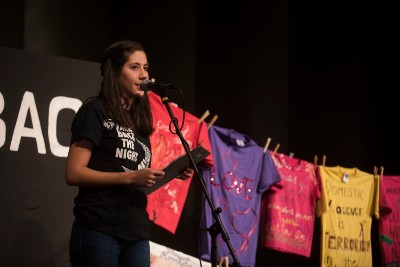
In the hundred years since Virginia Tech admitted its first five female students, women have become a mighty force at what was once an all-male institution. Their biggest champions? Often other women. Here, the women behind four female-focused campus communities share how they stand up for faculty, staff, and students.
United Feminist Movement
At the end of March, more than 600 T-shirts will flutter from ropes strung across the Drillfield, each color-coded to represent different kinds of pain. Red, pink, and orange are for survivors of rape or sexual assault; yellow for survivors of battery and assault; purple for those who have been attacked because of their sexual orientation; green and blue for survivors of incest or childhood sexual abuse; black for those who have been disabled by violence; and white for those who have died. Up close, the messages they bear about gender-based violence become visible: “I will not get over it, but I will get past it.” “I am a survivor, and I will fight for those that cannot.”
Since the Clothesline Project was brought to the New River Valley in 1994, over 600 shirts have been made, many by women at Virginia Tech. “Those shirts are homegrown,” said Susan Anderson, a senior instructor in the Department of Mathematics and the long-time faculty advisor to United Feminist Movement, the student organization that coordinates the project on campus. “We live in a fairly safe community here in Blacksburg, but this kind of violence still happens here.” She talks about a United Feminist Movement member who was raped in an off-campus apartment. “It took her a long time to be able to sleep at night.”
Activities such as the Clothesline Project and the annual Take Back the Night rally and march, scheduled for March 31 at 7 p.m. on Henderson Lawn on the Blacksburg campus, won’t solve the problems of gender-based violence, but they do raise awareness of gender-based violence and point survivors toward local resources.
At Take Back the Night, United Feminist Movement students will offer simple strategies for creating positive change, such as intervening as a bystander or politely condemning sexist or homophobic jokes. “We do not believe that just coming to a Take Back the Night is going to stop violence in our community,” Anderson said. “But we do believe that if 500 people are at Take Back the Night and they all listen to survivors’ stories, then they in their own individual everyday life can do these small little steps. By collectively doing these things every day, 500 people are going to lessen violence in our community.”
To learn more about participating in the Clothesline Project or Take Back the Night, visit the Women’s Month calendar or contact Susan Anderson at [email protected] or 540-231-8041.
Hypatia Living-Learning Community
Of 2,321 first-year students accepted into the College of Engineering in 2021, only 501 were women. But when Haritha Gnanasegar was a first-year computer engineering student, she had no idea she was in such a minority. That’s because she lived in the Hypatia living-learning community for female engineering students.
In Hoge Hall, Hypatians, as they’re called, live, study, and socialize among fellow female engineers. It’s where Gnanasegar found a built-in support system in a male-dominated major. “It is empowering and encouraging to see that you’re not the only one struggling, and you have other people there to hold your hand while you all walk together,” she said.
Women living in Hypatia are invited to network with corporate partners and alumni looking to mentor or recruit women in engineering. They also take a first-year experience course specifically for Hypatia students, where they “find a safe space to have those open and honest conversations about being a woman in engineering,” said DeAnna Katey, director of undergraduate student programs for Virginia Tech’s Center for the Enhancement of Engineering Diversity (CEED).
Behind the scenes, Katey and her CEED team even batch Hypatians into first-year science and math classes together so they’ll feel less alone. “They can see, ‘OK, they’re might not be a lot of us, but I’m not in here by myself.’”
Many female students, including Gnanasegar, appreciate the sense of camaraderie so much that they return to Hypatia as upper-class leaders. Last semester, Gnanasegar, who’s now working on a master’s degree in computer engineering at Virginia Tech, took a graduate class where she was the only woman among 18 students. Luckily, her support system of fellow Hypatia women still have her back. “These are the people I want as my bridesmaids,” she said. “I’m still friends with them.”
Women’s Center at Virginia Tech
Knowing what to do after you’ve experienced something like sexual assault or harassment isn’t always clear. That’s where Christine Dennis Smith and her team of trained advocates at the Women’s Center at Virginia Tech step in. Since 1994, the center has been key for students, faculty, and staff grappling with the trauma of gender-based violence. “It’s very important to have somebody walk with you through that,” Smith said. “And that’s really an honor to do.”
As co-director of the Women’s Center, Smith acts as a guide for victims navigating their options. (Despite the center’s name, Women’s Center clients can be of any gender identity.) She may connect them with medical help or counseling resources, such as the Cook Counseling Center, the Women’s Resource Center of the New River Valley’s 24-hour crisis hotline, or support groups hosted by the Women’s Center. She might accompany a client making a police report. Or she might explain the procedures for a Title IX investigation. “They have a confidential resource while they’re determining what they want to do, and then we provide support and advocate for whatever folks want or need in those various processes,” Smith explained.
Sometimes Smith has the privilege of seeing people grow and heal. One woman she accompanied to court is now in law school.
Often, she will simply sit with people in their pain. “I think it’s less about giving advice,” she said, “and more about listening, believing, and providing support and empowerment to folks to do what they need to do in their own healing journey.”
Women’s Alliance and Caucus
Things have changed significantly for women at Virginia Tech in the past 100 years. But members of Virginia Tech’s Women’s Alliance and Caucus know there’s more to be done.
The group, established in 2016, advocates for female faculty, staff, and graduate students at Virginia Tech on issues that affect them — for instance, equity in hiring, promotion, and compensation; efforts to remove systemic barriers to advancement; identification and resolution of safety issues; and access to quality child care for university employees and students.
Part of the Women’s Center, the Women’s Alliance and Caucus works with the Commission on Equal Opportunity and Diversity to submit concerns and proposed resolutions. “We want to make sure that women feel that the caucus can be a means to, if not initiate a conversation, amplify that conversation about areas of concern and actions that need to be considered,” said Lujean Baab, chair of the executive committee of the Women’s Alliance and Caucus and senior director of grants for Technology-enhanced Learning and Online Strategies.
Baab believes that progress on women’s issues will advance more rapidly as more women are informed about options to address gender bias, defy conventional gender roles, and call out inequities. “I see our role as clearing the path for those women who are ready to be where we want them to be,” she said. “I think the upcoming generations of women joining Virginia Tech are ready to speak up for the changes they see need to be made, and we are here to lead and support them.”










